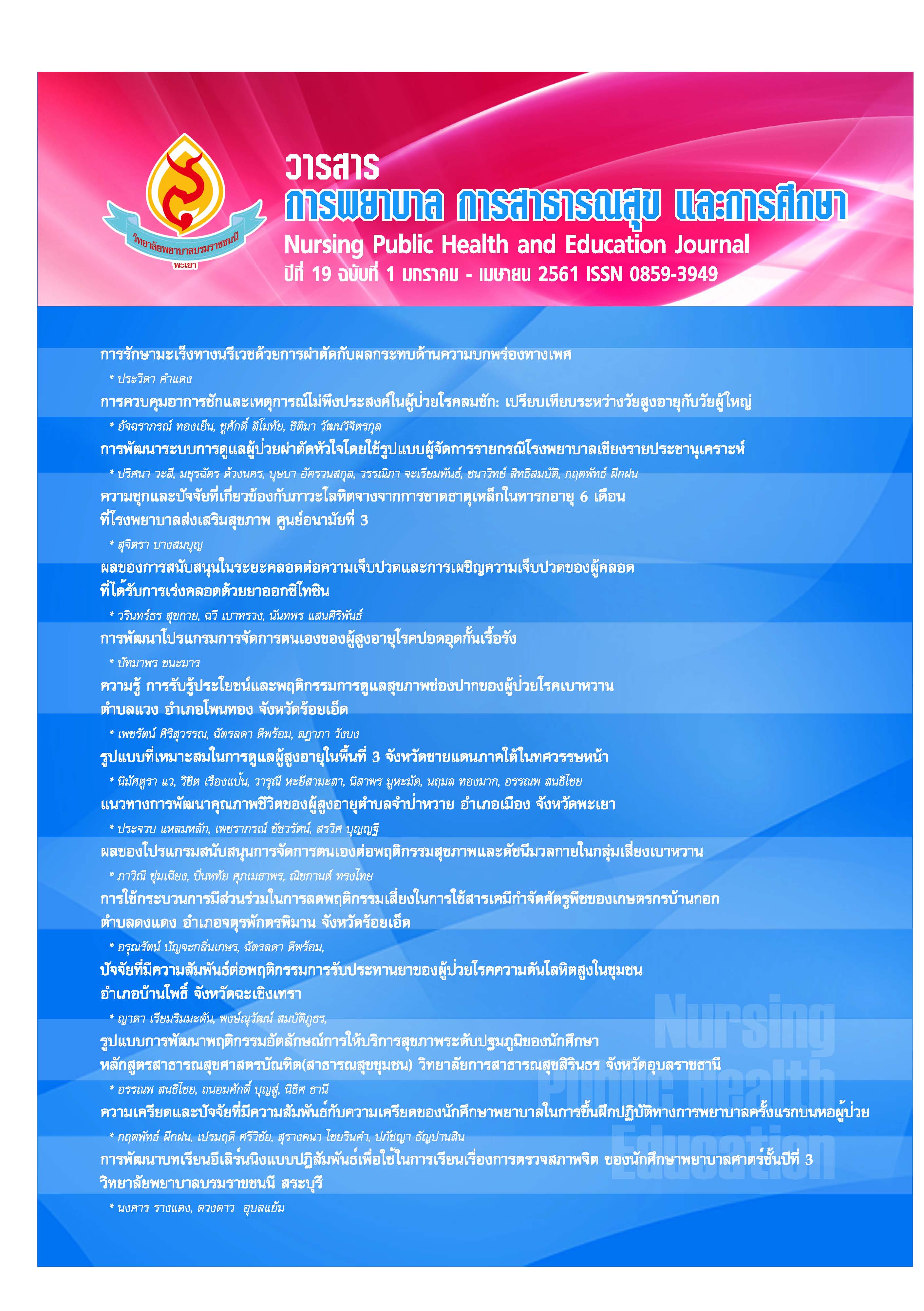การศึกษาความชุกและปัจจัยที่เกี่ยวข้องกับภาวะโลหิตจางจากการขาด ธาตุเหล็กในทารกอายุ 6 เดือนที่โรงพยาบาลส่งเสริมสุขภาพ ศูนย์อนามัยที่ 3
คำสำคัญ:
ความชุก, ปัจจัยที่เกี่ยวข้อง, ภาวะโลหิตจางจากการขาดธาตุเหล็ก, เด็กอายุ 6 เดือน, Prevalence, Factors related, Iron deficiency anemia, Infants Age 6 Monthsบทคัดย่อ
การศึกษาครั้งนี้เป็นการวิจัยแบบCross-sectional study ซึ่งมีวัตถุประสงค์เพื่อศึกษาความชุกและปัจจัยที่มีความเกี่ยวข้องกับภาวะโลหิตจางจากการขาดธาตุเหล็กในทารกอายุ 6 เดือนที่มารับบริการที่คลินิกตรวจสุขภาพเด็กดี โรงพยาบาลส่งเสริมสุขภาพ ศูนย์อนามัยที่ 3 ในช่วงวันที่ 1 ตุลาคม 2557 – 30 กันยายน 2558 เก็บรวบรวมข้อมูลโดยใช้แบบสอบถามข้อมูลจากผู้ปกครองและแบบบันทึกข้อมูลผลการตรวจทางห้องปฏิบัติการ วิเคราะห์ข้อมูลด้วยสถิติพรรณนา(Descriptive Statistics) สถิติเชิงอนุมาน (Inferential Statistics) คือ Chi-Square และ Odd ratio ผลการวิจัยพบว่า ทารกอายุ 6 เดือน จำนวนทั้งสิ้น 255 คน พบเด็กที่มีภาวะโลหิตจางร้อยละ 18 และเข้ากับ เกณฑ์วินิจฉัยภาวะโลหิตจางจากการขาดธาตุเหล็ก (Iron Deficiency Anemia=IDA) จำนวน 9 คน คิดเป็นความชุก 3.5 ต่อ 100 ประชากร โดยทารกจำนวนดังกล่าวนี้ทั้งหมดมีประวัติการกินนมแม่ อย่างเดียว และมารดาไม่ได้กินยาเสริมธาตุเหล็กขณะตั้งครรภ์ จากการวิเคราะห์ปัจจัยที่เกี่ยวข้องกับ การเกิดภาวะโลหิตจางจากการขาดธาตุเหล็กของทารกอย่างมีนัยสำคัญทางสถิติคือ อายุของมารดา(p=0.002), รายได้ครอบครัว (p=0.01), ประวัติการคลอดของมารดา (p=0.03), การไม่ได้รับยาเสริมธาตุเหล็กหลังคลอดของมารดา (p=0.04) และการเจ็บป่วยของทารกในช่วง 6 เดือนแรก (p=0.04) โดยมีข้อเสนอแนะในเรื่องของปัจจัยที่เกี่ยวข้องกับภาวะ IDA ครั้งนี้ เป็นเพียงการศึกษาเบื้องต้นเท่านั้น อาจไม่สามารถบอกถึงปัจจัยเสี่ยงทั้งหมดได้ แต่ทำให้ทราบปัจจัยบางอย่างที่สามารถส่งเสริมและป้องกันภาวะ IDA แก่เด็ก หากในอนาคตมีการศึกษาในเด็กจำนวนมากขึ้นและครอบคลุมปัจจัยอื่นๆหรือการทำวิจัย เชิงคุณภาพ น่าจะเป็นประโยชน์อย่างยิ่งในการวางแผนนโยบายต่างๆ ในการป้องกันภาวะโลหิตจางจากการขาดธาตุเหล็กในเด็ก
Prevalence and Related Factors of Iron Deficiency Anemia among Infants Age 6 Months at Health Promoting Hospital, Regional Health Promotion Center 3
A Cross-sectional study which aims to determine the prevalence and related factors of iron deficiency anemia among infants age 6 months at Health promoting hospital, Regional health promotion center 3 from October 1, 2014 to September 30, 2015. Data were collected by using questionnaires from parents and laboratory records. Descriptive statistics and inferential statistics were (Chi-Square and Odd ratio) used to analyzed the data. The number of infants 255 are enrolled in this study. The prevalence of anemia is 18 percent. The prevalence rate of infants who was diagnosed of iron deficiency anemia(IDA) is 9 people, representing 3.5 per 100 population. All IDA infants have a history of exclusive breastfeeding and their mothers do not receive iron supplement during pregnancy. Analysis of factors associated with anemia due to iron deficiency in infants was statistically significant; maternal age (p = 0.002), household income (p = 0.01), mode of delivery (p = 0.03), Maternal do not receive iron supplement in postpartum peroid. (p = 0.04), and the illness of infants in the first sixth months (p = 0.04). The factors related to iron deficiency anemia in these infants are a preliminary study may not have all the risk factors. However, this research indicates some factors that can promote and prevent IDA in infants. If future studies in more infants and more factors associated with IDA or doing quality research, it will be useful in planning policies to promote and prevent IDA in infants.



